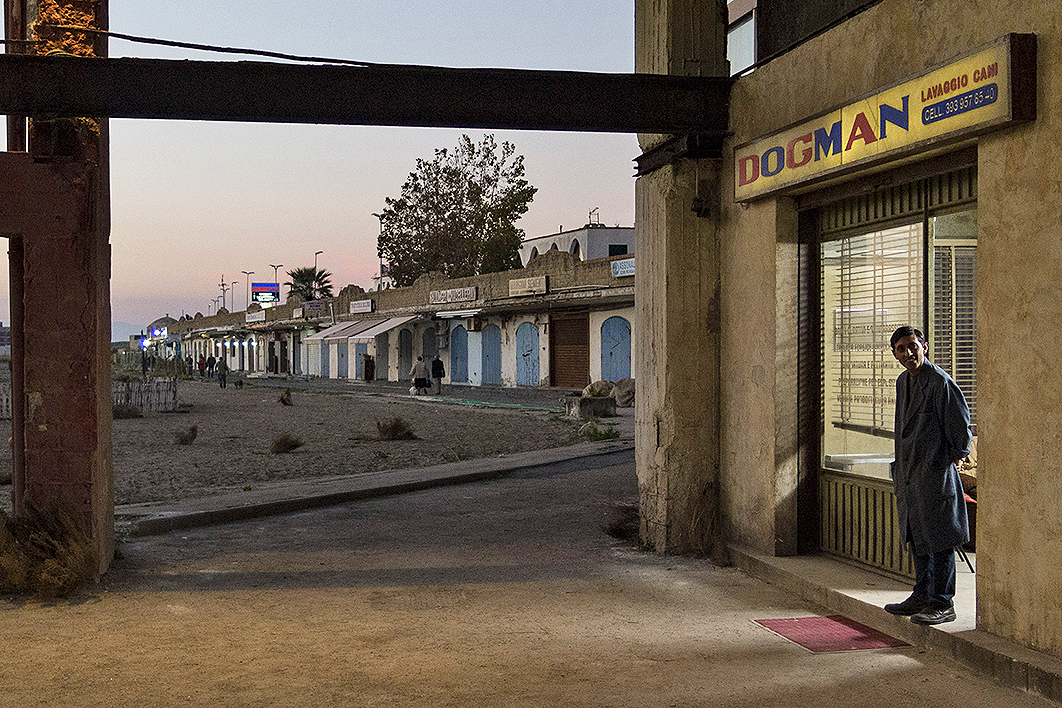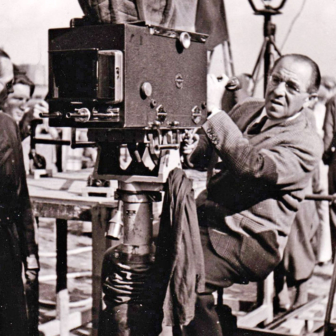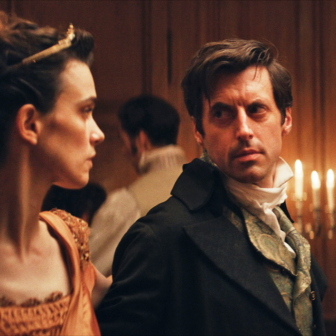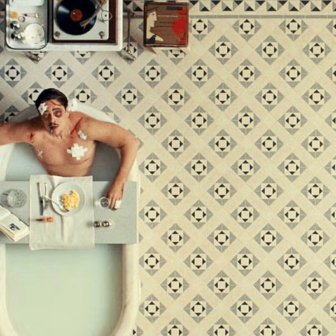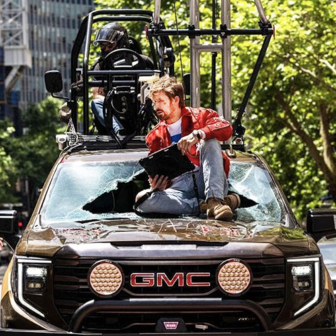Most cities have a periphery, a place of dreams half built and then abandoned. A cafe, a bar, a car repair shop. Crumbling factories, unprepossessing small businesses. They are the places to where politicians and planners push the poor.
In Dogman, Marcello (Marcello Fonte) has a dog-grooming business in one of these places, on the periferia of Rome. He’s a small man, and timid, but dogs trust him. He understands them. He talks to them as he works.
Marcello also has a young daughter, Sofia (Alida Baldari Calabria), who lives with her mother but comes in to see him after school. He shows her a little of the business, but she prefers to muck around on his beat-up computer. Together they daydream of holidays they would like to take. “Where shall we go this week?” he asks her.
Marcello has few other pleasures, apart from joining games of five-a-side soccer on the sands nearby. He does have an unlikely friend, Simoncino (a terrific performance by Edoardo Pesce), a hulking ex-boxer and petty thief who terrorises the neighbourhood. It’s an odd, co-dependent relationship: Marcello is weedy, a cajoler. Simoncino is big enough to protect him. Marcello also deals a little coke on the side. Simoncino is increasingly addicted, and when he comes looking for the stuff, he is deaf to Marcello’s pleas not to use it in front of his daughter.
Slowly, things spiral out of control. Sitting round a cafe table, the good old boys of the neighbourhood agree that Simoncino must be taken care of. But before this can happen, Simoncino pressures a reluctant Marcello into abetting a robbery that brings the wrath of the entire neighbourhood down on the dog-groomer’s head.
Matteo Garrone is an interesting director. As soon as his 2008 film Gomorrah, a many-stranded portrait of the working of the Camorra in Naples, had won him the Grand Priz at Cannes, he got to work on the strange and compelling Tale of Tales, set in an imaginary kingdom. It was his Gomorrah co-author, investigative journalist Roberto Saviano, who claimed the subsequent public platforms and co-authored an Underbelly-like television series of the same name. (Saviano has just had his police protection against the Mafia cancelled by the new interior minister, Matteo Salvini, after an exchange of insults. In Italy, crime and politics are never far apart.)
Dogman is not a Mafia film as such. Nor, despite being inspired by a notorious decades-old murder, is it a true-crime drama. It is an exploration of the psychology of the bully and the psychology of the weakling, and it is sometimes funny, sometimes tender and at times grisly to the point of grotesquery. These flourishes — Garrone is good at them — could make it easy to overlook the fact that the film is also embedded in a community, a neighbourhood of the periferia with its own unspoken codes, loyalties and power structures. It is acceptance, finally, that Matteo craves, and this drives the tragedy.
Lead actor Marcello Fonte once worked as a prison guard not far from the film’s setting. According to Garrone, he stepped into his first acting role when someone in the prison drama group died. His unforgettable Marcello won him the best actor award at Cannes.
Dogman is screening at the Melbourne International Film Festival, which is also running a season of Italian crime films from the seventies, the “years of lead.” On the whole, they are cult films: it will be wonderful to see one of the best of them, Investigation of a Citizen Above Suspicion, starring the late, great Gian Maria Volontè, back on a big screen.
It’s a pity that MIFF isn’t screening La Terra dell’Abbastanza (retitled Boys Cry for the English-language market) alongside Dogman. This new film, from the twenty-something D’Innocenzo brothers, is also set in Rome’s periferia, shot in similar locations, and tells the story of two young men who, driving home from their jobs delivering pizza, accidentally hit and kill a man. They run, but when the victim turns out to be a man marked as an informer by the local crime syndicate, the father of one of the boys sees an opportunity; he lets it be known locally so his son can take the credit and use the death as an introduction to the gang. The boys’ descent from collecting money from local prostitutes to a mob-directed assassination is depicted as a moral struggle, and community mores play a huge part.
There is nothing cool about Italian crime, and there never was. In periferie across Italy, the choices people make about whom to trust locally played a crucial role in the recent national election, driving the huge populist vote for Five Star candidates across the south. The neo-fascist Lega attracted just one patch of support in the south, for the same Matteo Salvini who has since withdrawn Roberto Saviano’s protection. Salvini, a wily Milanese career politician, moved from the north to gain a toehold in Reggio Calabria a few years ago and is now the driving force in the new government; one of his key campaign supporters has just been charged with fraud.
As a young Sicilian student of public administration told me, the vote reflected the fact that those who had held power, from all parties, “have done nothing to help our problems.” Youth unemployment in the south stands at 46 per cent; if Five Star is unable to deliver on its promised minimum-income scheme then its supporters could start looking elsewhere.
At one time, you could have seen Sunshine, in Melbourne’s west, as a kind of Australian periferia. This working-class neighbourhood was intended as a planned community around the Sunshine Harvester factory at the turn of the twentieth century; by the 1970s, when I went there as a young journalist to make a radio documentary, it was struggle street, albeit with community-aid services. Now it’s gentrifying. West of Sunshine, a debut feature from Jason Raftopoulos also screening at MIFF, has a title that is deliberately ambiguous.
Jimmy (Damian Hill) is a driver with deliveries to make. He also has until the end of the day to raise the cash to pay a massive gambling debt to his former boss, a heavy man indeed. But it’s school holidays and Jimmy has promised his estranged wife he will take care of their son. So young Alex has to come on the road with him. During the day he will make some risky choices, with his son an increasingly mutinous passenger.
The relationship is treated with respect: Alex has his own ideas about what his father is up to. A father loses his temper, a son protests, they reconcile. Raftopoulos is not the first director to notice that these days most personal exchanges between parents and children happen when they are alone together in a car.
There is a lot of action behind the wheel in this film, and very little sense of place. It’s well shot but the locations are generic: the workshop, the loading dock, the pizza joint, the roadside hamburger stand, the TAB. I assume this is deliberate: it gives the film universality. But it may also rob it of poetry.
West of Sunshine does suggest what life is like now for so many working Australians: hours spent behind the wheel — punctuated by traffic jams, money pressures and time constraints — in featureless suburbs, with family and friends fragmented and scattered across the city. The strength of this film is the unaffected onscreen relationship between Hill, as the increasingly desperate Jimmy, and Ty Perham (Hill’s real-life stepson), as Alex. The warmth convinces, and so do the fights. To adapt Margaret Thatcher: “There is no community: there are only individuals.” In this case, that individual is a father trying to raise his son right. ●
